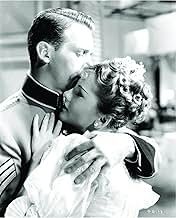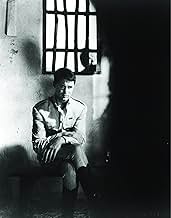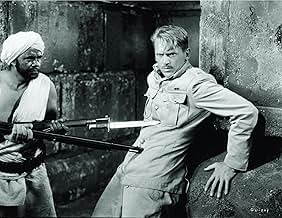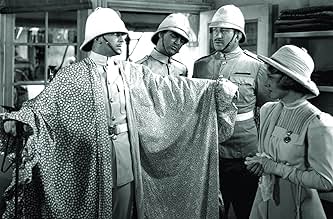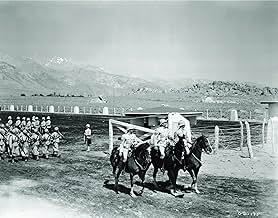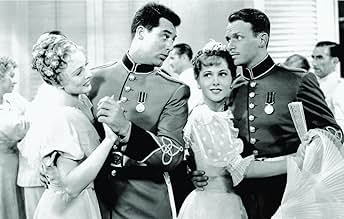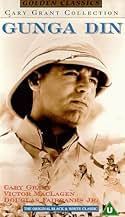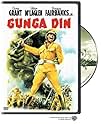Gunga Din
- 1939
- Tous publics
- 1h 57min
NOTE IMDb
7,2/10
13 k
MA NOTE
En Inde, au XIXe siècle, trois soldats britanniques et un porteur d'eau indigène doivent empêcher une renaissance massive et secrète du culte meurtrier des Thuggee avant qu'il ne puisse se r... Tout lireEn Inde, au XIXe siècle, trois soldats britanniques et un porteur d'eau indigène doivent empêcher une renaissance massive et secrète du culte meurtrier des Thuggee avant qu'il ne puisse se répandre dans tout le pays.En Inde, au XIXe siècle, trois soldats britanniques et un porteur d'eau indigène doivent empêcher une renaissance massive et secrète du culte meurtrier des Thuggee avant qu'il ne puisse se répandre dans tout le pays.
- Réalisation
- Scénario
- Casting principal
- Récompenses
- 4 victoires au total
Charles Bennett
- Telegraph Operator
- (non crédité)
Gene Coogan
- Lancer
- (non crédité)
Jimmy Dime
- Thug
- (non crédité)
George Du Count
- Pandu Lal
- (non crédité)
Anna May the Elephant
- Elephant
- (non crédité)
Avis à la une
I have seen "Gunga Din" several times. It is not a strict re-telling of the Kipling work but a studio era take on it. It is jingoistic and hokey but it is an entertaining and uplifting film.
Those that bemoan the "un-PC" tone of the film need to look at it in context. The underlying theme of the piece is that these British soldiers come to hold a member of a group of people they had (until that time) regarded as savages, in higher regard than most of their compatriots. The ideas of universal human qualities and nobility are driven home in a very emotional, if a little ham-fisted way. Considering the racial atmosphere in America at the time, this was not exactly a statement without some daring.
To condemn this film or the original story for racism is to miss the point entirely. That was the time and for its time, the messages here are incredibly progressive. Besides, even if the film were racist, only a fool discards a classic piece of art because he or she disagrees with the content of the message. Pretty much all critics and film historians list Griffith's "Birth of a Nation" somewhere in the top 3 films of all time, regardless of the fact that the heroes of the picture are the KKK. The message was wrong but the film transformed the whole of film-making forever. Do we discard that too? Do we burn all copies of Joseph Conrad's novella "Heart of Darkness" because some perceive the narrator to be a bigot? To do so would be robbing generations of a classic example of well crafted storytelling at its best. Such behavior is ignorance in its basest form.
But, you know, that's just what I think.
Those that bemoan the "un-PC" tone of the film need to look at it in context. The underlying theme of the piece is that these British soldiers come to hold a member of a group of people they had (until that time) regarded as savages, in higher regard than most of their compatriots. The ideas of universal human qualities and nobility are driven home in a very emotional, if a little ham-fisted way. Considering the racial atmosphere in America at the time, this was not exactly a statement without some daring.
To condemn this film or the original story for racism is to miss the point entirely. That was the time and for its time, the messages here are incredibly progressive. Besides, even if the film were racist, only a fool discards a classic piece of art because he or she disagrees with the content of the message. Pretty much all critics and film historians list Griffith's "Birth of a Nation" somewhere in the top 3 films of all time, regardless of the fact that the heroes of the picture are the KKK. The message was wrong but the film transformed the whole of film-making forever. Do we discard that too? Do we burn all copies of Joseph Conrad's novella "Heart of Darkness" because some perceive the narrator to be a bigot? To do so would be robbing generations of a classic example of well crafted storytelling at its best. Such behavior is ignorance in its basest form.
But, you know, that's just what I think.
For years I thought this knockabout service comedy was a product of John Ford, especially with Victor McLaglen as one of the leads. It certainly has the same rough house humor that Ford laces his films with.
To my surprise I learned it was George Stevens who actually directed it. Still I refuse to believe that this film wasn't offered to John Ford, but he was probably off in Monument Valley making Stagecoach.
Victor McLaglen along with Cary Grant and Douglas Fairbanks, Jr., play three sergeants in the Indian Army who have a nice buddy/buddy/buddy camaraderie going. But the old gang is breaking up because Fairbanks is engaged to marry Joan Fontaine. Not if his two pals can help it, aided and abetted by regimental beastie Gunga Din as played by Sam Jaffe.
The Rudyard Kipling poem served as the inspiration for this RKO film about barracks life in the British Raj. The comic playing of the leads is so good that it does overshadow the incredibly racist message of the film. Not that the makers were racist, but this was the assumption of the British there at the time, including our leads and Gunga Din shows this most effectively.
The British took India by increments, making deals here and there with local rulers under a weak Mogul emperor who was done away with in the middle of the 19th century. They ruled very little of India outright, that would have been impossible. Their rule depended on the native troops you see here. Note that the soldiers cannot rise above the rank of corporal and Gunga Din is considerably lower in status than that.
Note here that the rebels in fact are Hindu, not Moslem. There are as many strains of that religion as there are Christian sects and this strangling cult was quite real. Of course to those being strangled they might not have the same view of them as liberators. But until India organized its independence movement, until the Congress Party came into being, these people were the voice of a free India.
But however you slice it, strangling people isn't a nice thing to do and the British had their point here also. When I watch Gunga Din, I think of Star Trek and the reason the prime directive came into being.
Cary Grant got to play his real cockney self here instead of the urbane Cary we're used to seeing. Fairbanks and McLaglen do very well with roles completely suited to their personalities.
Best acting role in the film however is Eduard Ciannelli as the guru, the head of the strangler cult. Note the fire and passion in his performance, he blows everyone else off the screen when he's on.
Favorite scene in Gunga Din is Ciannelli exhorting his troops in their mountain temple. Note how Stevens progressively darkens the background around Ciannelli until all you see are eyes and teeth like a ghoulish Halloween mask. Haunting, frightening and very effective.
It was right after the action of this film in the late nineteenth century that more and more of the British public started to question the underlying assumptions justifying the Raj. But that's the subject of Gandhi.
Gunga Din is still a great film, entertaining and funny. It should be shown with A Passage to India and Gandhi and you can chart how the Indian independence movement evolved.
To my surprise I learned it was George Stevens who actually directed it. Still I refuse to believe that this film wasn't offered to John Ford, but he was probably off in Monument Valley making Stagecoach.
Victor McLaglen along with Cary Grant and Douglas Fairbanks, Jr., play three sergeants in the Indian Army who have a nice buddy/buddy/buddy camaraderie going. But the old gang is breaking up because Fairbanks is engaged to marry Joan Fontaine. Not if his two pals can help it, aided and abetted by regimental beastie Gunga Din as played by Sam Jaffe.
The Rudyard Kipling poem served as the inspiration for this RKO film about barracks life in the British Raj. The comic playing of the leads is so good that it does overshadow the incredibly racist message of the film. Not that the makers were racist, but this was the assumption of the British there at the time, including our leads and Gunga Din shows this most effectively.
The British took India by increments, making deals here and there with local rulers under a weak Mogul emperor who was done away with in the middle of the 19th century. They ruled very little of India outright, that would have been impossible. Their rule depended on the native troops you see here. Note that the soldiers cannot rise above the rank of corporal and Gunga Din is considerably lower in status than that.
Note here that the rebels in fact are Hindu, not Moslem. There are as many strains of that religion as there are Christian sects and this strangling cult was quite real. Of course to those being strangled they might not have the same view of them as liberators. But until India organized its independence movement, until the Congress Party came into being, these people were the voice of a free India.
But however you slice it, strangling people isn't a nice thing to do and the British had their point here also. When I watch Gunga Din, I think of Star Trek and the reason the prime directive came into being.
Cary Grant got to play his real cockney self here instead of the urbane Cary we're used to seeing. Fairbanks and McLaglen do very well with roles completely suited to their personalities.
Best acting role in the film however is Eduard Ciannelli as the guru, the head of the strangler cult. Note the fire and passion in his performance, he blows everyone else off the screen when he's on.
Favorite scene in Gunga Din is Ciannelli exhorting his troops in their mountain temple. Note how Stevens progressively darkens the background around Ciannelli until all you see are eyes and teeth like a ghoulish Halloween mask. Haunting, frightening and very effective.
It was right after the action of this film in the late nineteenth century that more and more of the British public started to question the underlying assumptions justifying the Raj. But that's the subject of Gandhi.
Gunga Din is still a great film, entertaining and funny. It should be shown with A Passage to India and Gandhi and you can chart how the Indian independence movement evolved.
10slokes
Anyone with a young boy in the house who won't watch black & white movies should put this on their television set. When the child walks by, wondering what all the on screen shouting and shooting's about, tell him this is a picture for adults and that he isn't big enough to watch it yet. That'll hold him there for a few minutes; director George Stevens and his team will keep him to the end.
I think my father did that to me, anyway, and I'm the better man for it. This classic adventure yarn, set in India during the British occupation, features a trio of Army sergeants who find their tight union facing dissolution as one prepares to marry his sweetheart. Help arrives in the form of a vicious Thuggie revolt that the soldiers find themselves united against.
"Gunga Din" was one of the great movies to come out of Hollywood's finest year, 1939. Even more than most great movies from that Golden year, it is entertaining in a very immediate and accessible way. The theme music is instant hummable nirvana. While shot in California, the camera work (the only thing in "Gunga Din" that got so much as an Oscar nomination) has a windblown grandeur that feels very much like the Raj of a hundred years before. The battle scenes are shot in a very realistic manner, not too violent but very messy as people fall and shoot and run in all corners of each frame in a way that feels real, not staged like some Cecil B. DeMille Biblical slaughter fest.
The script doesn't just set up action scenes, it also develops the relationship of the three sergeants with great dollops of humor. The main focus is on Sgt. Cutter, chasing after tall tales of golden treasures. It's a rare actioner for Cary Grant, and his lightness is just right for a film that never takes itself seriously even as it develops taut suspense.
Anchoring the trio is Sgt. MacChesney (Victor McLaglen), who dotes over his elephant Annie and tries to protect Cutter from his own hare-brained schemes. He's just as funny in his own way, leaving Sgt. Ballantine (Douglas Fairbanks Jr., displaying some nice Errol Flynnish dash) as the one with the love interest and grounding enough to know he needs to chuck his boyish pals and grow up.
If "Gunga Din" was a Lifetime movie, it would be about Joan Fontaine's efforts to save her man from his two loser friends and their skull crushing hijinks. But since it's a guys' film, the accent here is on how the threesome must stay together and save Ballantine from a fate worse than death, not only marriage, but as Cutter indignantly exclaims several times, the tea business, too.
The political correctness police are hard on this film, not so much for the gender issue but the idea of British soldiers saving poor Indians from the vicious Thuggies. It reeks of colonial apologia. Thankfully, this film was made back when, and the producers thus felt no need to spell out the obvious liberalism at the heart of the film, that these three sergeants, so full of derring-do and false racial pride, have to be saved along with the rest of their army by a humble bhisti that only one of the three had any time for when he sought their approval. After all, for all their swashbuckling glory, the film's true sacrifice involves the title character, played so heart-wrenchingly by Sam Jaffe.
Back when this film was made, movie mogul Jack Warner had a saying: You want to send a message, use Western Union. Still, it seems like the messages were flying fast and furious in "Gunga Din." I watch the film now and wonder if audiences back then were meant to wonder what Gunga Din was really up to when he led Cutter to the golden temple. Was he really plotting revenge against his British overlords? Would he have been justified in doing so, especially given MacChesney's cold treatment of him? When Col. Weed delivers that eulogy, the poem by Rudyard Kipling on which the film is loosely based, was it with a nod in the direction of imperialism's folly, of lording it over someone who proved "a better man than I am" in the end? What did they make of the Guru's great speech, delivered in perfect clipped English: "You have sworn an oath as soldiers to maybe die for a faith, which is your country, England. Well, I can die for my country and my faith as readily as you...India, farewell."
Of course, the same character also instructs his brutal followers: "Kill for the love of killing! Kill for the love of Kali! Kill! Kill! Kill!" Which means we are allowed to hate him and root for the British, and save the questions about what it all means for later.
What "Gunga Din" means to me, most of all, is the quickest, surest 90-minute thrill ride on video. Cutter never found his golden temple, but there's one for all of us watching "Gunga Din."
I think my father did that to me, anyway, and I'm the better man for it. This classic adventure yarn, set in India during the British occupation, features a trio of Army sergeants who find their tight union facing dissolution as one prepares to marry his sweetheart. Help arrives in the form of a vicious Thuggie revolt that the soldiers find themselves united against.
"Gunga Din" was one of the great movies to come out of Hollywood's finest year, 1939. Even more than most great movies from that Golden year, it is entertaining in a very immediate and accessible way. The theme music is instant hummable nirvana. While shot in California, the camera work (the only thing in "Gunga Din" that got so much as an Oscar nomination) has a windblown grandeur that feels very much like the Raj of a hundred years before. The battle scenes are shot in a very realistic manner, not too violent but very messy as people fall and shoot and run in all corners of each frame in a way that feels real, not staged like some Cecil B. DeMille Biblical slaughter fest.
The script doesn't just set up action scenes, it also develops the relationship of the three sergeants with great dollops of humor. The main focus is on Sgt. Cutter, chasing after tall tales of golden treasures. It's a rare actioner for Cary Grant, and his lightness is just right for a film that never takes itself seriously even as it develops taut suspense.
Anchoring the trio is Sgt. MacChesney (Victor McLaglen), who dotes over his elephant Annie and tries to protect Cutter from his own hare-brained schemes. He's just as funny in his own way, leaving Sgt. Ballantine (Douglas Fairbanks Jr., displaying some nice Errol Flynnish dash) as the one with the love interest and grounding enough to know he needs to chuck his boyish pals and grow up.
If "Gunga Din" was a Lifetime movie, it would be about Joan Fontaine's efforts to save her man from his two loser friends and their skull crushing hijinks. But since it's a guys' film, the accent here is on how the threesome must stay together and save Ballantine from a fate worse than death, not only marriage, but as Cutter indignantly exclaims several times, the tea business, too.
The political correctness police are hard on this film, not so much for the gender issue but the idea of British soldiers saving poor Indians from the vicious Thuggies. It reeks of colonial apologia. Thankfully, this film was made back when, and the producers thus felt no need to spell out the obvious liberalism at the heart of the film, that these three sergeants, so full of derring-do and false racial pride, have to be saved along with the rest of their army by a humble bhisti that only one of the three had any time for when he sought their approval. After all, for all their swashbuckling glory, the film's true sacrifice involves the title character, played so heart-wrenchingly by Sam Jaffe.
Back when this film was made, movie mogul Jack Warner had a saying: You want to send a message, use Western Union. Still, it seems like the messages were flying fast and furious in "Gunga Din." I watch the film now and wonder if audiences back then were meant to wonder what Gunga Din was really up to when he led Cutter to the golden temple. Was he really plotting revenge against his British overlords? Would he have been justified in doing so, especially given MacChesney's cold treatment of him? When Col. Weed delivers that eulogy, the poem by Rudyard Kipling on which the film is loosely based, was it with a nod in the direction of imperialism's folly, of lording it over someone who proved "a better man than I am" in the end? What did they make of the Guru's great speech, delivered in perfect clipped English: "You have sworn an oath as soldiers to maybe die for a faith, which is your country, England. Well, I can die for my country and my faith as readily as you...India, farewell."
Of course, the same character also instructs his brutal followers: "Kill for the love of killing! Kill for the love of Kali! Kill! Kill! Kill!" Which means we are allowed to hate him and root for the British, and save the questions about what it all means for later.
What "Gunga Din" means to me, most of all, is the quickest, surest 90-minute thrill ride on video. Cutter never found his golden temple, but there's one for all of us watching "Gunga Din."
In the most general of terms Gunga Din not only qualifies as a classic but more or less defines the term "classic" in every respect. I wouldn't know how to fault this film, as it succeeds on every level.
You begin with a workable idea for a story. Then you follow that up with superb script writing, direction and photography, and wonderful performances by the entire cast. The end result of that collaboration of successful effort is, as it must be . . . a classic.
And not only does Gunga Din succeed as a mere action adventure, which would be impressive enough, but it's comedic relief serves as a virtual workshop for aspiring directors who, lamentably today, just don't seem to get that part of the equation in all too many cases--you know, as in movie-making is an art? Or at least it used to be.
There's seems to be a gap in our society's culture when it comes to the enjoyment of art which attempts to communicate on various intellectual levels. I would put this down to dubious education all around if I had to pick just one culprit, but I don't know, maybe that's too simplistic. I experience fear, though, when I read negative comments from viewers of films as rich in various, and to me obvious, qualities as is Gunga Din. All I hear in these cases, at best, is a fundamental lack of artistic appreciation at base.
Well, for these people I imagine that all that's left is to simply go out and buy the cheap remakes of the classic films, which are, of course, a dime a dozen nowadays. And then I suppose they will get what they need: presumably a package of questionable casting, incompetent direction, in many instances virtually no attempt at intelligent character development whatsoever, along with x-many minutes of gratuitous violence and endless smash-ups, replete, of course, with plenty of LFE icing for this new-age filmic cake.
Meanwhile, I hope that my daughter will come to appreciate the great films such as Gunga Din for the classic productions they were upon release, and which they certainly remain today.
You begin with a workable idea for a story. Then you follow that up with superb script writing, direction and photography, and wonderful performances by the entire cast. The end result of that collaboration of successful effort is, as it must be . . . a classic.
And not only does Gunga Din succeed as a mere action adventure, which would be impressive enough, but it's comedic relief serves as a virtual workshop for aspiring directors who, lamentably today, just don't seem to get that part of the equation in all too many cases--you know, as in movie-making is an art? Or at least it used to be.
There's seems to be a gap in our society's culture when it comes to the enjoyment of art which attempts to communicate on various intellectual levels. I would put this down to dubious education all around if I had to pick just one culprit, but I don't know, maybe that's too simplistic. I experience fear, though, when I read negative comments from viewers of films as rich in various, and to me obvious, qualities as is Gunga Din. All I hear in these cases, at best, is a fundamental lack of artistic appreciation at base.
Well, for these people I imagine that all that's left is to simply go out and buy the cheap remakes of the classic films, which are, of course, a dime a dozen nowadays. And then I suppose they will get what they need: presumably a package of questionable casting, incompetent direction, in many instances virtually no attempt at intelligent character development whatsoever, along with x-many minutes of gratuitous violence and endless smash-ups, replete, of course, with plenty of LFE icing for this new-age filmic cake.
Meanwhile, I hope that my daughter will come to appreciate the great films such as Gunga Din for the classic productions they were upon release, and which they certainly remain today.
This old film just has some important elements the bulk of current films seem to lack: strength of character, genuine heroism and an understanding of what true altruism and sacrifice mean. And Sam Jaffe, a terrific (now-unfortunately-deceased) character actor breaks the viewer's heart as the "regimental bhisti, Gunga Din," who takes constant abuse and gives his all, including his life, to carry water to the men of the Queen's regiment even in the thick of battle.
Funny, I don't remember it as a comedy, though I think there may have been some spots of humor in it, but then, I was rather young the last time I saw it on the Late, Late Show... too many years ago to even want to think about.
It's a wonderful movie and I hope the animated version, coming out next year, does the poem and story the same good service the 1939 film managed to do.
Highly recommended.
Funny, I don't remember it as a comedy, though I think there may have been some spots of humor in it, but then, I was rather young the last time I saw it on the Late, Late Show... too many years ago to even want to think about.
It's a wonderful movie and I hope the animated version, coming out next year, does the poem and story the same good service the 1939 film managed to do.
Highly recommended.
Le saviez-vous
- AnecdotesThe gong in the title sequence is the same one used to summon King Kong six years earlier.
- GaffesBallantine and MacChesney are bound and gagged when the last Thuggee is about to behead them after Gunga Din sounds the alarm. Cutter shoots the Thuggee and Ballantine and MacChesney are unbound as they rush to Cutter's side.
- Citations
Sgt. Thomas 'Tommy' Ballantine: You displease me greatly, and I ignore the both of you.
- Crédits fousThe credits appear on a gong. Standing next to the gong is a Hindu man, and every time he strikes the gong, the credits change.
- Versions alternativesGerman theatrical version was cut by approx. 12 minutes. This version was later shown on TV but never released on any home media format. Only in 2018 the film was released on DVD, with approx. 4 minutes restored.
- ConnexionsFeatured in Les Corps sauvages (1959)
Meilleurs choix
Connectez-vous pour évaluer et suivre la liste de favoris afin de recevoir des recommandations personnalisées
- How long is Gunga Din?Alimenté par Alexa
Détails
- Date de sortie
- Pays d’origine
- Langue
- Aussi connu sous le nom de
- Aufstand in Sidi Hakim
- Lieux de tournage
- Société de production
- Voir plus de crédits d'entreprise sur IMDbPro
Box-office
- Budget
- 1 910 000 $US (estimé)
- Durée1 heure 57 minutes
- Couleur
- Rapport de forme
- 1.37 : 1
Contribuer à cette page
Suggérer une modification ou ajouter du contenu manquant


